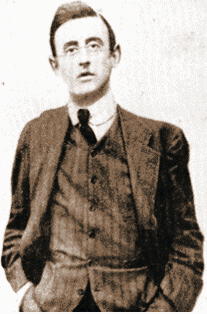Joseph Mary Plunkett
| Joseph Plunkett Seosamh Pluincéid |
|
|---|---|
 |
|
| Born |
21 November 1887 Dublin, Ireland |
| Died | 12 May 1916 (aged 28) Kilmainham Gaol, Dublin, Ireland |
| Buried at | Arbour Hill Prison, Dublin |
| Allegiance |
Irish Volunteers Irish Republican Brotherhood |
| Years of service | 1913–1916 |
| Rank | Commandant General |
| Unit | Dublin Brigade, Irish Volunteers |
| Commands held | General Post Office, Dublin |
| Battles/wars | Easter Rising |
| Spouse(s) | Grace Gifford |
Joseph Mary Plunkett (Irish: Seosamh Máire Pluincéid, 21 November 1887 – 4 May 1916) was an Irish nationalist, poet, journalist, and a leader of the 1916 Easter Rising.
Plunkett was born at 26 Upper Fitzwilliam Street in one of Dublin's most affluent districts. Both his parents came from wealthy backgrounds, and his father, George Noble Plunkett, had been made a papal count.
Plunkett contracted tuberculosis at a young age and spent part of his youth in the warmer climates of the Mediterranean and North Africa. He spent time in Algiers where he studied Arabic literature and language and composed poetry in Arabic. He was educated at the Catholic University School (CUS) and by the Jesuits at Belvedere College in Dublin and later at Stonyhurst College, in Lancashire, England where he acquired some military knowledge from the Officers' Training Corps. Throughout his life, Joseph Plunkett took an active interest in Irish heritage and the Irish language, and also studied Esperanto. Plunkett was one of the founders of the Irish Esperanto League. He joined the Gaelic League and began studying with Thomas MacDonagh, with whom he formed a lifelong friendship. The two were both poets with an interest in theatre, and both were early members of the Irish Volunteers, joining their provisional committee. Plunkett's interest in Irish nationalism spread throughout his family, notably to his younger brothers George and John, as well as his father, who allowed his property in Kimmage, south Dublin, to be used as a training camp for young men who wished to escape conscription in Britain during the First World War. Men there were instead trained to fight for Ireland.
...
Wikipedia
